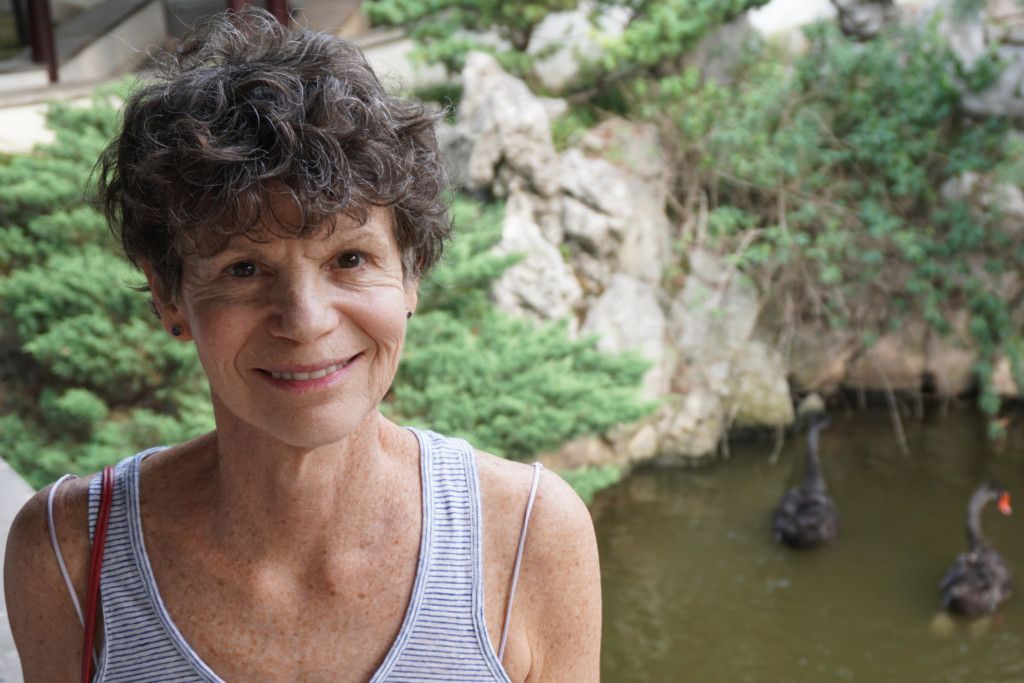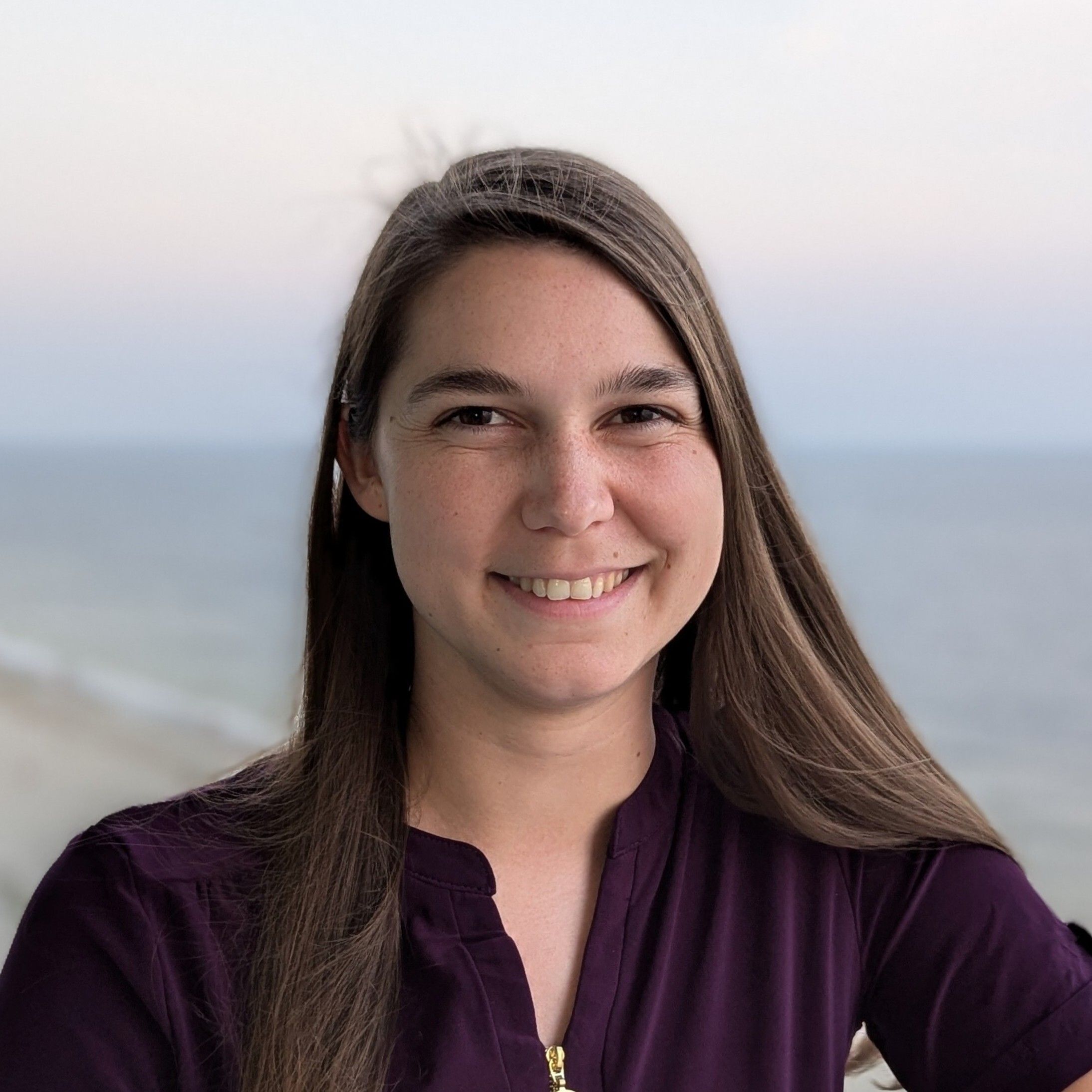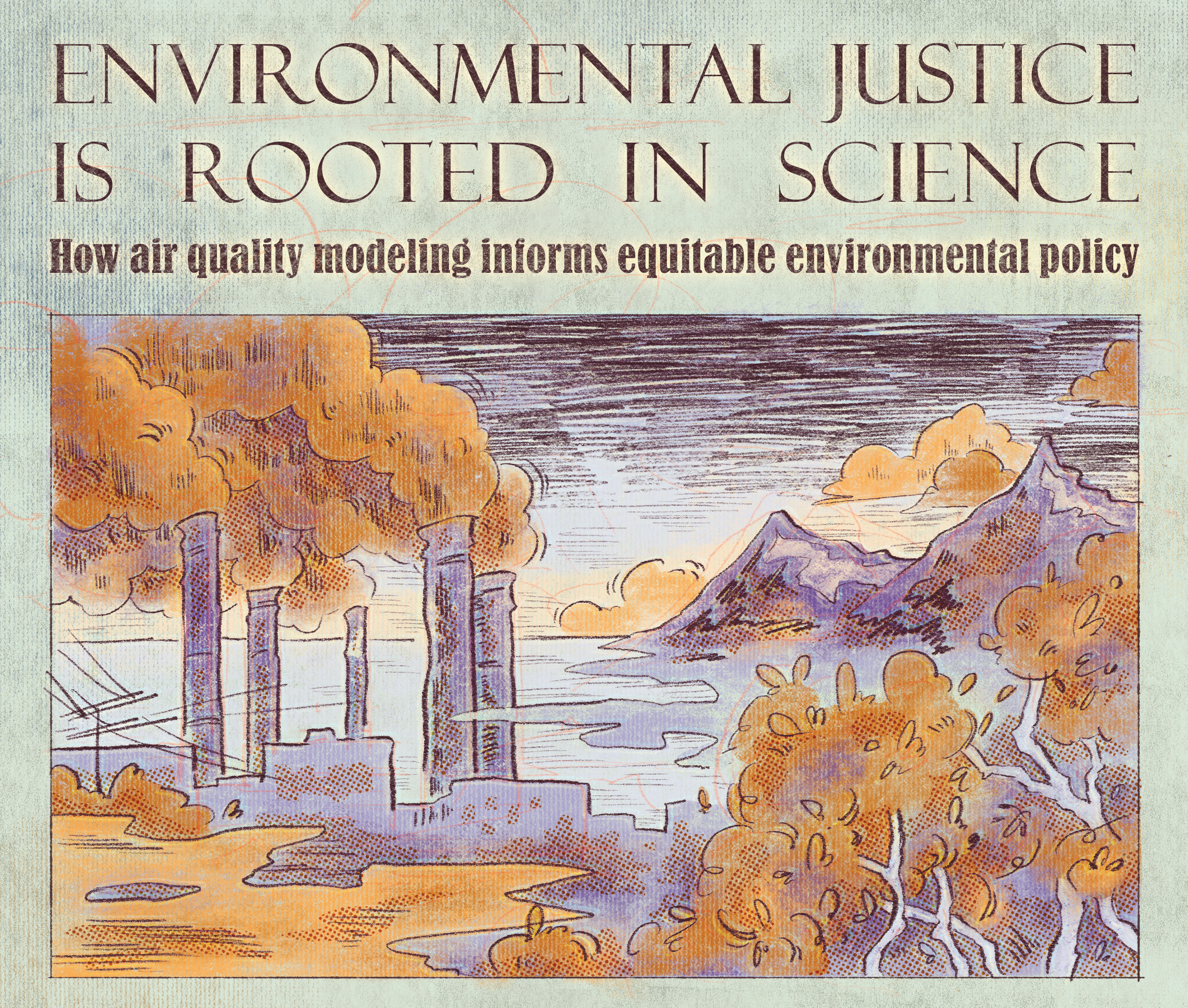The Sustaining Thread of Mathematics: An Interview with Lisa Goldberg
August 7, 2019

This article is part of STEMinism in the Spotlight, a monthly interview series.
When I met Lisa Goldberg at a seminar on causal inference, I could immediately sense that she had a unique curiosity and an ability to be successful in any endeavor she attempted. Interviewing her only confirmed that suspicion: she is a mathematician that has applied her incredible mathematical ability to a diverse set of fields, from topology, to finance, to sports statistics. Currently, she is the Co-Director of the Consortium for Data Analytics in Risk (CDAR), Adjunct Professor of Economics and Statistics at UC Berkeley and Director of Research at the Aperio Group. Though Lisa’s path has not been without challenge, she has come through with incredible wisdom and reflection. I found her power to adapt to any new situation and problem she was confronted with, as well as to reflect critically on academia’s successes and failures, incredibly comforting as I set out on my career as a statistician.
In her own words: “I look back on this path, and I’ve done a lot of things. I’m never sure if it’s good or not, but one thing to say is that the sustaining thread through all of it, even though the things I’ve done are really different, is mathematics.”
AG: How did you first become interested in mathematics?
LG: The same as with swimming, I just started doing it when I was two. By the way, I swim 2,000 meters every day. I’ve been doing these things all my life, and I don’t know the answer to why I was doing them and not other things.
AG: Is there anything in particular about mathematics that you like best?
LG: It’s the “language in which God wrote the universe.” It’s much more of, in my mind, an art than a science, even though it’s often clustered with science when you do classification. It’s really beautiful and elegant, and just as an art form, its own reward. In terms of what it does for you if you want to be an economist, a statistician, a climate scientist, a writer, a historian or anything else, it teaches you how to try to think things through. What’s the good element in any of those subjects? It’s understanding the limit between what you do and don’t know, and math leaves you no way out of facing that. You cannot fake it. You either have a proof, or a counterexample, or you just don’t know. This is frustrating. Mathematicians go by this, but it’s frustrating for everybody else. People will say, “I have this evidence here, why don’t you believe it?” or “Why are you going slowly to figure out these corner cases that don’t matter?” This is a real division between mathematics and everything else. It’s worked okay for me, but it means putting up with a lot of dissonance. People don’t like my pace necessarily. I’m always behind everybody, and slower.
Because you are very methodical and careful?
I’ve just never been very fast. Some mathematicians work at lightning speed. You’ve seen those mathematics competitions? I’ve never been that person. You get slower as you get older, and I was not particularly fast when I was young. But being fast is not the same thing as being a mathematician, although it is kind of flashy and cool. There’s a different skill of being able to get to the bottom of something, or being able to say, “I really don’t understand that” or “here’s another way to understand that”, that shows you something different. That, certainly in my case, takes a lot of time. If you go out into a subject where there’s a lot of bright people, many of them smarter than you and all of them faster than you, and here you are kind of plodding along at your own pace, it takes a certain amount of I don’t know what to stay in the game. You have to be really determined.
I feel like especially with mathematics I’ve noticed that.
You have to really want to know the answer. I think that’s the thing that helps you stay with it. Does it wake you up at three in the morning? Does it interfere with your breakfast? Do you just have to know? It’s the only thing that will get you there because otherwise it is just too hard.
You got your PhD in mathematics from Brandeis and then went on to be a Professor of Mathematics at CUNY. In 1993, you left academia and joined Barra. When you left academia to go to Barra, how did you make that decision?
Oh, this is a very female thing, I came over here to be with my boyfriend Ken. UC Berkeley didn’t want to hire me. I had a bunch of visiting professorships. Then one day, Ken’s reading the paper and looking at the Wall Street Journal (I never figured out how he got to be a world-famous number theorist, it seems like he’s always in the Monterey Market or reading the newspaper). There he was reading the newspaper, and he said, “there’s this interesting quantitative firm right across the street from the university.” So, I walked across the street and tried to meet them. The firm, Barra, which is an amazing thing that I love to talk about, was the Google of its day. It was started in somebody’s garage in the 1970s with a quantitative idea. It was started not by a bunch of grad school dropouts like Google, but by a bunch of UC engineering professors. Namely Barr Rosenberg, but also Richard Grinold and others. It was founded on a really amazing idea. It’s not esoteric; it’s not the sort of thing academics like. It’s taking some very simple-minded gadget and just looking at it from another way. It changed the way a quantity in finance, which is an essential quantity called Market Beta, was estimated. It was brilliant. They started this company that got very big. When I joined in 1993, it had just gone public on NASDAQ. I was the new nobody and there was a lot of rich people around and it did very well. Then the market crashed, and there was all this falling of stock prices. When it was well below its high, Morgan Stanley went and bought it and so lots of things have happened to Barra since then. Now, it exists as a brand. It’s no longer part of Morgan Stanley, it’s now part of something called MSCI. There’s Barra software, risk models, tools, but there’s no Barra company. The company Barra is part of, MSCI, is wildly, wildly successful. I was there for 19 years and retired in 2012.
Was your work at Barra completely different from what you were doing before in academia?
Totally different. It couldn’t have been more different.
How did that transition from academia to finance feel? To my understanding, this was the beginning of quantitative finance on Wall Street and companies were hiring mathematicians who had no specific training in the area.
Well, denial really helped. I’m not a big fan of denial usually, but it helped to pretend that it made sense when it didn’t. I didn’t have the slightest idea what was going on around me when I took that job. I don’t know why they hired me. I certainly wouldn’t have hired myself in that situation. It was a time when leaving [academia] in mathematics was viewed as sin. It still is kind of a sin to leave the mothership that is academia—that’s not true in statistics or computer science anymore, but it’s still true, unbelievably, in math, which I cannot get my head around. So, it was like a fall from grace. I felt ashamed. It was very complicated, and it was also very interesting, because there were all these people around that didn’t seem to know that I had committed this great sin. They were just busy working, and slowly I tried to figure out what was going on around me. It was really interesting.
Do you think it was the right decision to leave academia and join Barra?
Ken and I talk about this. We could have taken a different path in life and left Berkeley. I think we would have gotten hired as professors at some nice place, and I would have had a different life. But this one worked out fine, and I don’t know the answer to that.
Why do you think it is viewed as this “great sin” to leave academia?
One thing I really hope is that people with quantitative skills, whatever area they are in, can really perceive their own value. I hope they see all the different possibilities, and that there’s different good fits for different kinds of people. So, before I answer that question, I want to say that the moment I stopped feeling ashamed of myself was after a long time, maybe 10 years, in this company, when I was talking to our chief operating officer. At that time, we were just newly part of Morgan Stanley. In Morgan Stanley there was a guy I really admired who was a mathematician and an engineer and a very, very original quantitative thinker. He did great academic work, then went to industry and made piles and piles of money, and now he’s back in academia. When Morgan Stanley acquired Barra, I was looking around Morgan Stanley—which is a huge place—for interesting people, and I saw he was there. We were in a little corner of Morgan Stanley and I was trying to tell the COO that there was this really interesting, original thinker that had done fantastic, foundational work. I told him that I admired the work for its creativity and application. The COO, who had been part of the Morgan Stanley family for a while, turned red in the face and said, “Him? All he can do … all he can do is write papers!” He was disgusted. I realized in that second that the contempt that academia felt for industry was completely reciprocated and then some. I just cracked up, because this is a good spot to be in because I speak both of these languages. It was a really, really high moment, and I think everything changed. I had come to appreciate both places and see their blind spots. A lot of what I’ve tried to do since then is elevate this practice of both and get them to talk to each other.
How’s that going?
Well, we have CDAR. I think it’s going great. Now in my retirement, I’m half here and half at a company called Aperio. I love this. It’s strenuous, because you’ll find out if you ever do anything half time it really isn’t half time. People say, “how do you allocate your time?” and I say, “well 90% of my time is in one and 90% of my time is in the other.” It’s just how it works out in practice. Fortunately, I have a very supportive, curious family that puts up with this. It’s been remarkable. Aperio, much more than Barra or Morgan Stanley ever did, is so grateful for what academics bring them. And is CDAR grateful for its industry partners? You bet.
And so back to the original question of why math views leaving academia as a great sin?
Well, it’s so insular. First of all, the kind of personality that you have that enables mathematical thinking is not very collaborative or outreaching, because it requires a kind of focus that nothing else does.
I wonder if some of that is a cycle that keeps perpetuating itself?
Surely it’s some of that. I think some of it is the very nature of doing mathematics as a solitary and not social activity, and part of it is that mathematicians have not made the effort to go beyond the way I think a lot of other departments have. I think they are kind of entrenched in the way they’ve always done things and don’t really think highly of these alternatives. It’s probably improving, and change doesn’t come overnight, but hopefully it will change. Hopefully the math department here will get with the data science initiative. That would really help. In industry, you have to really have an attitude towards what’s the group goal, and not saying, “oh well I can’t do that but there’s a problem over here that I can solve.” That could be very nice, but it may or may not be useful for what’s trying to be accomplished. Physicists and engineers, for example, do a lot better because they are always asking “what are we trying to get?” and using their creativity that way. Getting these mathematics kids more willing to think about someone else’s problem I think would be a way. The faculty also have to be willing to think about someone else’s problem.
I’m sure too with the more theoretical math, the detachment from application doesn’t help.
I think it’s a really insane division. If you go back to great mathematicians of the past, Gauss -- I mean, make one up -- they’re all trying to figure out applications. So why do we have “pure” mathematicians and the soiled kind that I’ve become? I really dislike the distinction. It makes no sense.
It’s very bizarre.
I think it’s harmful. I don’t even see why the statistics department is distinct from math. Not only have I never taught a statistics course, I’ve never actually taken a statistics course. I got a PhD without knowing what the standard deviation was. I learned that at Barra. So, I’m kind of a hack. Most of the statistics I learned, I learned in industry. I’ve had a very jagged education on the basic things in statistics. Coming to understand statistics was always like, “well, here’s a symbol and it means something and here’s a statement about that symbol and it’s true under some hypotheses and what are they and what are its limitations and what does it imply.” I don’t see that as different from any other kind of mathematics.
Speaking of industry, I saw that you have a bunch of patents. Is that how it works in finance? Is that similar to academia?
It’s different. Patents have their own history and doing patents is intellectually almost like the opposite of writing a paper. It was so interesting to write those things. They really don’t want to refer to new ideas so much as clever uses of existing stuff out there. Basic science isn’t really patentable.
Financial services are driven by capitalism. No one wants to patent anything: it’s expensive and time consuming. You take your thing and give it to a bunch of lawyers. They rewrite it in their own language and giveyou back something that’s completely incomprehensible. Also, your formulas are all screwed up because they don’t use LaTeX, so they type them in Microsoft Word. There’s all that stuff associated with getting patents written. Then what happens is companies have war chests of these things and use them to threaten each other in various ways, so a patent that makes a ton of money is kind of rare. It’s a bet that if you patent a bunch of stuff something might be useful, offensively or defensively.
It was an interesting experience to write them: a different kind of intellectual game and language with a different sense of what was more and less important. It’s really fun to work with lawyers, I like working with them. Whether it’s patent lawyers or any other kind of lawyers. In fact, I’m contemplating projects with three different law groups. Not expert witness stuff, these are other things. Part of what we are doing in CDAR and at Aperio is impact investing.
There’s a whole bunch of people out there that think you should invest for the good of the world, not just for the good of your wallet. Many are arguing that this can be turned into a win-win, because just by doing the right thing, you will profit. If you look at sustainable investing or impact investing you’ll find trillions of dollars in it. It’s the darling of Wall Street at the moment, and there’s a lot of legal stuff that’s interesting. Because you can say, “well, if you’ve got arating agencyover here saying these are the good companies, whatever that means, you can look at how many lawsuits they have after regulatory breaches.” Merging this kind of data about companies with legal data turns out to provide interesting insights and is just coming together. That’s one area that I’m sort of interested in.
How did you get interested in that? It seems like you have a very diverse set of things that you are interested in.
I do. Too many! I always try to keep one project where I’m up to my elbows in the basic math of it, but I certainly can’t do that on all of them. So how did we get interested in that? Well, MSCI was trying to do it in 2008-2009 and I stuck my toe in the water with a paper called “Is There a Green Factor?” At the time when I would give that talk, it was right after the financial crisis, and I was also giving a talk on tail, i.e., extreme event risk. I’d get a big audience for the extreme event risk and then when they’d announce the green talk three-quarters of the audience would leave the room. It was not popular. Now it’s the opposite. You can’t get people to talk about tail risk because they think it’s conquered. It’s not. But everybody wants to talk about sustainability, so it emerged as an industry. How did I get interested in it? Well, Aperio does a lot of it. We manage many billions of sustainable dollars at Aperio. Aperio, by the way, is a personalized investing company. Also, two CDAR partners and a former CDAR partner all want projects in this so we have postdocs working on it. There are really different aspects and things you can say about sustainable investing. The thing people want to say, and there’s a whole bunch of academics who will say this, plus all of Wall Street, is that if you follow only your conscience, you will outperform the market. You know, invest in companies with more diverse leadership on the board, that have recycling programs, or that are giving convicts a second chance in their community. These are the companies that are really going to win.
Sounds positive!
It is very encouraging. There’s a lot of rhetoric out there about that. It’s just enormous. It’s been on my mind all week, which is why I’m talking about those particular projects. So, we’re doing it because it’s of interest to the business and CDAR, and it’s just generally interesting. It’s an important subject because a lot of people’s money is at stake. It’s very related to climate scientists. There are different aspects, but a big aspect of it is environmentally sustainable investing. Just like we want to understand what humans are doing to the planet, we want to understand what human activity on the planet is affecting financial markets. It’s very important.
I also saw your hot hands research. It’s very cool that you analyzed data to test the long-held idea that basketball players on a scoring streak have a higher chance of making their next basket.
Thank you! Did you follow the end of the NBA season? The obvious study to do based on it is, how do you reduce the impact of injuries on outcome in sports? It’s a good question. It’s a really quantitative analysis.
I have a new paper. The “hot hand” is a very hard thing to formulate correctly. Conditional probabilities will mess you up and you’ve got Simpson’s Paradox. It’s fraught. So, one question you might ask if you’re a psychologist is, what is making the audience’s heart pump faster when someone seems to be on this streak? What are they perceiving? We reformulated the definition in a different way. I would say that it isn’t so much that Steph Curry makes five baskets in a row that’s important, but maybe it’s that he’s really on. He’s taken a lot of shots and is making a lot of shots. We ask the question, are game averages distributed in an unusual way around the season average? Maybe he’s really “hot” when he’s making most of his shots. We formulated that idea and ran it to see if there was a hot hand in that way. In other words, take Curry and suppose his season average is 50 percent, which isn’t that far off, he could either be getting 50 percent every game or he could be doing half at 0 percent and half at 100 percent. Is there something unusual in the way his game averages deviate around his season average? We didn’t really find much.
Hm...
Well, I think it’s great actually! It’s all to [Daniel] Kahneman and [Amos] Tversky’s insight: people do not get randomness. They teach this over and over again. We overreact quickly to patterns. Small amounts of data that have “1, 2, 3” what do you put next? 4, 5. Well maybe not, 1, 2, 3 you could do 5, 8, 13, right, if you’re clever? But you don’t just make up a random sequence after it even though 1, 2, 3 is the beginning of many random sequences. You don’t do it. You make up a pattern. Nobody is going to just start throwing numbers out. In fact, we can’t even make up random numbers. We don’t like randomness, and we don’t understand randomness. These two thinkers, Kahneman and Tversky, really teach us, over and over again with their experiments, just how bad our understanding of randomness is.
It’s so interesting, the interplay with our psychology.
Yeah, we aren’t wired right. You can try to outthink it, and of course here at Evans Hall we do, but it’s not our nature. Did you read “Thinking Fast and Slow”?
No, but I’ve heard it’s good.
You should. It’s good. That’s actually how I got on my feet after I retired. I said, “well, now I’m going to rest.” I didn’t rest. I don’t have a good aptitude for it. I was book review editor of a financial journal, called Quantitative Finance, so what I did when I quit Barra was I assigned myself reviewing Kahneman’s book. It took me a year; I didn’t know anything about behavioral finance. It’s a totally mind blowing and elevating book. That one really affected me, and that’s how I ended up doing this basketball research. In 2015, I was sitting in our seminar, and two students who were joint in statistics and the law school were giving a talk on the robotic judge that they had built. Then, one of them mentioned that there was a mistake in the hot hands research.
The hot hands subject was initiated in 1985 with a paper by Tversky, Gillovich and [Robert] Vallone. Tversky was a big basketball fan. He looked at the question of whether or not there was a hot hand which was and still is dogma in basketball and found none. In our paper, we kind of slavishly used his statistic, which I don’t like. We tried a lot of other ones, but the results didn’t change. The reason we did this sort of arcane thing was for historical purposes, to see how his statistic fared after correcting the error.
So, I’m listening to these two students and one of them happened to mention there was a mistake in that paper. For 30 years that paper had been a beacon of research because a lot of people didn’t believe it, and a lot of people objected to it the way you object to a statistics study: “well, they used the wrong dataset, they didn’t formulate the idea right, they should have done this, that and the other thing.” But nobody said they did their statistics wrong, and I thought, “how could Amos Tversky have made a statistics error?” When I heard about the error in that talk, I became obsessed with trying to figure out what kind of mistake he could have possibly made and what would happen if he corrected it.
The mistake is beautiful. It’s a beautiful mistake found by two statisticians at an Italian university. Really insightful. They found this small sample error. They go around claiming if you correct the error, the results reverse. I totally don’t believe this. Our results show the opposite. Tversky, Gillovich and Vallone’s conclusions stand. Correcting the error makes it easier to find exceptions and you just don’t find them.
But one thing I know about empirical research is that if you believe something enough you’ll find a way to verify it.
That’s kind of scary.
It is really scary, but it’s so true. It’s the most important thing. If you ever do empirical research, you have to get up every day and read about eugenics and stuff. You have to realize you are not better than those people that made that mistake.
So it’s on us.
Really. To wake up in the morning and try to dissociate yourself from your pet hypotheses and your ways of thinking.
One last question, I’ve recently started investing in the stock market so do you have any advice for me?
I totally do. Buy low and sell high.
Featured Image: Lisa Goldberg.





